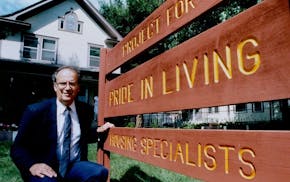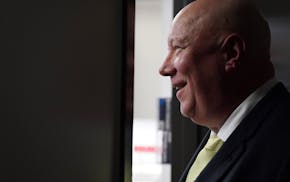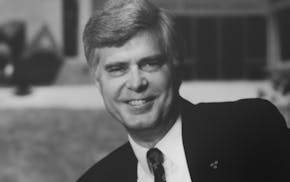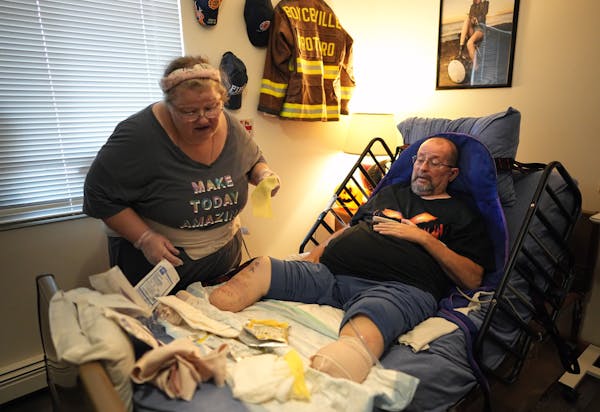Dennis Prothero was on his way home from work two days before Christmas in 2004 when a drunk driver smashed head on into his car.
A man who had longed awed others with his physical prowess — a military veteran, auto mechanic and volunteer firefighter who once rode bulls in a Wyoming rodeo — no longer had use of his leg muscles or much of his upper body.
Prothero would never walk again, but he would turn the second act of his life into an encore — becoming an inspiration to others struggling from life-altering accidents. He volunteered at the Courage Kenny Rehabilitation Institute, a rehabilitation center for people with disabilities, and became a doting father and proficient photographer of nature.
"It was like God took something away from him – the freedom of having two valuable legs – and gave him another life," said his brother, Kenneth Odegaard, who lives in Andover. "It was a miraculous change."
Yet Prothero's new life was cut short by a preventable string of ailments his family says was brought on by a critical shortage of home care workers.
For weeks last summer, Prothero was confined to his wheelchair up to 24 hours a day after losing most of his vital caregiving support at his apartment in Stillwater. The constant rubbing against the chair caused dangerous pressure sores to develop on his feet. Left untreated, the sores festered and became severely infected. Last October, doctors were forced to amputate both his legs below the knee to prevent the infection from spreading.
Weakened by the surgery and a prolonged hospital stay, Prothero contracted bacterial pneumonia and COVID-19, which killed the father of three in early December. He was 68 years old.
His death has come to symbolize the crisis-level shortage of people willing to care for adults with disabilities. In January, Prothero became a focal point of a legislative hearing on the health staffing shortages and proposed legislation that would increase wages for caregivers and state Medicaid rates for disability service providers. The hearing included emotional testimony from two of Prothero's close relatives, who blame his death on the Minnesota's frayed home health system.
"We are talking about a human being who deserves the rights we are all supposed to have," his sister, Gayle King, said tearfully in her testimony before a state Senate committee. "And God help us if we lose one more precious person."
Prothero was the second of six children born to a blended family from Hibbing. His father worked as a superintendent for the U.S. Steel taconite mine and his mother stayed home to raise the children. The Prothero kids were known as free spirits, and they would race around the northern Minnesota town on their bikes. Prothero fell in love with old cars and live theater. In high school, he starred as a flying monkey in Hibbing High School's production of the "Wizard of Oz," soaring in a harness above the stage.
"It was an absolutely idyllic childhood, full of adventures," said his brother, Kenneth.
After graduating from high school in 1972, Prothero joined the U.S. Army and was briefly stationed in Hawaii. From there, he moved to Lander, Wyo., where he worked in the mines, attended community college and made extra money as a radio disc jockey. Long-haired, lanky and muscular, Prothero also rode and wrestled steers in a local rodeo.
Prothero drifted through a series of odd jobs until he landed steady work as an auto mechanic in Menomonie, Wis. But just days after finding job stability, Prothero suffered his near-fatal accident. As a trained firefighter, he recalled giving instructions to paramedics as they pulled him from the wrecked vehicle — the feeling already lost in his legs. Overnight, his life became divided in two parts — the time before the accident and the time after.
After two years of intense rehabilitation, Prothero immersed himself in family and community life — volunteering at a food shelf and appearing in local theater productions. Kaitlyn Holmquist, his youngest daughter, recalled how Prothero insisted on going to all her high school dance classes because he wanted to learn the choreography. At a father-daughter dance in her senior year, Prothero performed the moves flawlessly from his wheelchair.
"I just told myself that, every day from here on out [after the accident] is going to bring better results," Prothero said in an interview weeks before his death. "If you keep saying that long enough, you start to believe it."
Prothero is survived by his three adult daughters, Brittany Deneys, Chelsey Klover, and Kaitlyn Holmquist; his grandchildren Emmett, Tobias and Flynn; as well as his five siblings. A memorial will be held at a later date.

Joe Selvaggio, social change agent who started Project for Pride in Living, dies at 87
Bemidji State University women's volleyball coach dies of cancer at age 41

Former Minnesota veterans commissioner, who resigned after ALS diagnosis, dies at 61

Axel Steuer, who guided Gustavus Adolphus College through 1998 tornado, dies at 81

